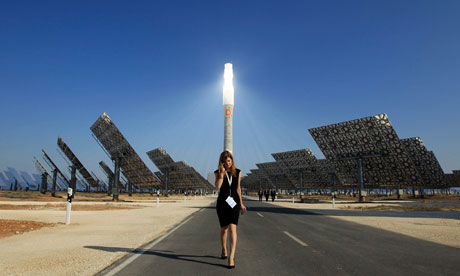Germany’s economy minister, Philipp Rösler, arrived in Athens on Thursday with businessmen, entrepreneurs, financiers and green energy experts in what was billed as a potentially groundbreaking visit to draw badly needed investment into the debt-stricken country.
The prospect of German business reviving Greece’s economy might have seemed far-fetched not long ago: at 109 in the World Bank’s “ease of doing business” index, the nation ranks below Bangladesh, Ethiopia and Yemen. Foreign direct investment in the country was on a par with that of Libya before the outbreak of war.


But like all great crises, Greece’s debt drama has also provided opportunities. Before departing Berlin, Rösler, who had previously advocated an “orderly bankruptcy” for Athens, said he hoped the visit would “act as a door-opener, so that personal contacts can be made”.
“In the spirit of solidarity, it is the task of all Europeans to help Greece get back on its feet economically,” he told the German broadcaster ZDF. “And we want to take German firms to Greece,” he added, where the crisis was both about “debt … and the lack of economic competitiveness”.
With markets far from convinced that Greece will be spared a default 17 months after it secured €110bn (£97bn) in rescue funds, Athens faces a tough sell. As the German delegation flew into the capital, the prime minister, George Papandreou, was working at breakneck speed to push a draconian austerity package through parliament – a condition made by the European Union, International Monetary Fund and European Central Bank, the country’s creditors, in return for further aid.
But while rampant corruption, a notorious bureaucracy and a weak justice system have also played a major part in keeping foreign firms out of the European Union state, the ruling socialists are also hoping the country’s abundant sunshine can attract German renewable energy companies. Among the 60 business leaders travelling with Rösler are several from the alternative energy sector, which, if expanded, could see foreign lenders help kickstart Greece’s recession-hit economy along with tourism and food processing.
Plans are also afoot to develop about 20,000 hectares of solar power parks for exporting renewable energy to Germany, according to media reports.
With the Greek economy poised to contract for a fourth consecutive year, officials say green energy could create 60,000 jobs at a time of record unemployment.
In the wake of Japan’s Fukushima nuclear disaster, the decision of the German chancellor, Angela Merkel, to close all 17 German nuclear reactors by 2022, alternative sources of energy are set to become increasingly important for Berlin.
“Greece could become the showcase of solar development in Europe’s ‘sun belt’ and that development could become the main driver of Greece’s green economic growth,” said Costas Karayiannis, chief executive of Greece’s only solar energy investment fund, Axeon Navitas. “Germany is the global leader in solar energy and it has a lot less sun than Greece. It makes a lot of sense for it to invest in this type of project here.”
Most Greeks are not sure what to think, preferring to see what emerges from Rösler’s visit. Memories of Nazi rule in a country that saw one of the most brutal German occupations during the second world war are never far away – even if Berlin has emerged as the main provider of the bailout that has so far enabled Greece to avert bankruptcy.
Source: guardian
 Follow
Follow